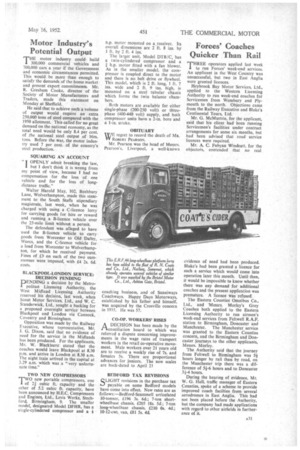Forces' Coaches Quicker Than Rail
Page 33

If you've noticed an error in this article please click here to report it so we can fix it.
'THREE operators applied last week 1 to run Forces' week-end services. An applicant in the West Country was unsuccessful, but two in East Anglia were granted licences.
Heybrook Bay Motor Services, Ltd., applied to the Western Licensing Authority to run week-end coaches for Servicemen from Wembury and Plymouth to the north. Objections came from the Railway Executive and Blake's Continental Tours, Ltd.
Mr. G. MeMurtrie, for the applicant, said that his client had been running Servicemen's facilities under contract arrangements for some Si,( months, but had been advised that road service licences were required.
Mr. A. C. Fabyan Windeatt, for the objectoi-s, contended that no real
evidence of need had been produced. Blake's had been granted a licence for such a service which would come into operation later this month. Until then, it would be impossible to know whether there was any demand for additional coaches and the present application was premature. A licence was refused.
The Eastern Counties Omnibus Co., Ltd., and Messrs. Morley's Grey Coaches both applied to the Eastern Licensing Authority to run airmen's week-end services from Feltwell R.A.F. station to Birmingham, Doncaster and Manchester. The Manchester service was granted to the Eastern Counties concern, and the Birmingham and Doncaster journeys to the other applicants, Messrs. Morley.
The Authority said that the journey from Feltwell to Birmingham was 34 hours longer by rail than by road, on the Manchester trip there was a difference of 54-6 hours and to Doncaster 31-4 hours.
During the hearing of evidence, Mr. W. G. Hall, traffic manager of Eastern Counties, spoke of a scheme to provide improved coach facilties from several aerodromes in East Anglia. This had not been placed before the Authority, but the company had made applications with regard to other airfields in furtherance of it.




















































































